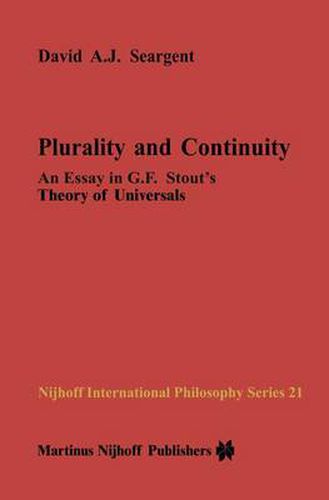Readings Newsletter
Become a Readings Member to make your shopping experience even easier.
Sign in or sign up for free!
You’re not far away from qualifying for FREE standard shipping within Australia
You’ve qualified for FREE standard shipping within Australia
The cart is loading…






This title is printed to order. This book may have been self-published. If so, we cannot guarantee the quality of the content. In the main most books will have gone through the editing process however some may not. We therefore suggest that you be aware of this before ordering this book. If in doubt check either the author or publisher’s details as we are unable to accept any returns unless they are faulty. Please contact us if you have any questions.
by D. M. Armstrong In the history of the discussion of the problem of universals, G. F. Stout has an honoured, and special. place. For the Nominalist, meaning by that term a philosopher who holds that existence of repeatables - kinds, sorts, type- and the indubitable existence of general terms, is a problem. The Nominalist’s opponent, the Realist, escapes the Nominalist’s difficulty by postulating universals. He then faces difficulties of his own. Is he to place these universals in a special realm? Or is he to bring them down to earth: perhaps turning them into repeatable properties of particulars (universalia in res), and repeatable relations between universals (universalia inter res)? Whichever solution he opts for, there are well-known difficulties about how particulars stand to these universals. Under these circumstances the Nominalist may make an important con cession to the Realist, a concession which he can make without abandoning his Nominalism. He may concede that metaphysics ought to recognize that particulars have properties (qualities, perhaps) and are related by relations. But, he can maintain, these properties and relations are particulars, not universals. Nor, indeed, is such a position entirely closed to the Realist. A Realist about universals may, and some Realists do, accept particularized properties and relations in addition to universals. As Dr. Seargent shows at the beginning of his book. a doctrine of part icularized properties and relations has led at least a submerged existence from Plato onwards. The special, classical.
$9.00 standard shipping within Australia
FREE standard shipping within Australia for orders over $100.00
Express & International shipping calculated at checkout
This title is printed to order. This book may have been self-published. If so, we cannot guarantee the quality of the content. In the main most books will have gone through the editing process however some may not. We therefore suggest that you be aware of this before ordering this book. If in doubt check either the author or publisher’s details as we are unable to accept any returns unless they are faulty. Please contact us if you have any questions.
by D. M. Armstrong In the history of the discussion of the problem of universals, G. F. Stout has an honoured, and special. place. For the Nominalist, meaning by that term a philosopher who holds that existence of repeatables - kinds, sorts, type- and the indubitable existence of general terms, is a problem. The Nominalist’s opponent, the Realist, escapes the Nominalist’s difficulty by postulating universals. He then faces difficulties of his own. Is he to place these universals in a special realm? Or is he to bring them down to earth: perhaps turning them into repeatable properties of particulars (universalia in res), and repeatable relations between universals (universalia inter res)? Whichever solution he opts for, there are well-known difficulties about how particulars stand to these universals. Under these circumstances the Nominalist may make an important con cession to the Realist, a concession which he can make without abandoning his Nominalism. He may concede that metaphysics ought to recognize that particulars have properties (qualities, perhaps) and are related by relations. But, he can maintain, these properties and relations are particulars, not universals. Nor, indeed, is such a position entirely closed to the Realist. A Realist about universals may, and some Realists do, accept particularized properties and relations in addition to universals. As Dr. Seargent shows at the beginning of his book. a doctrine of part icularized properties and relations has led at least a submerged existence from Plato onwards. The special, classical.